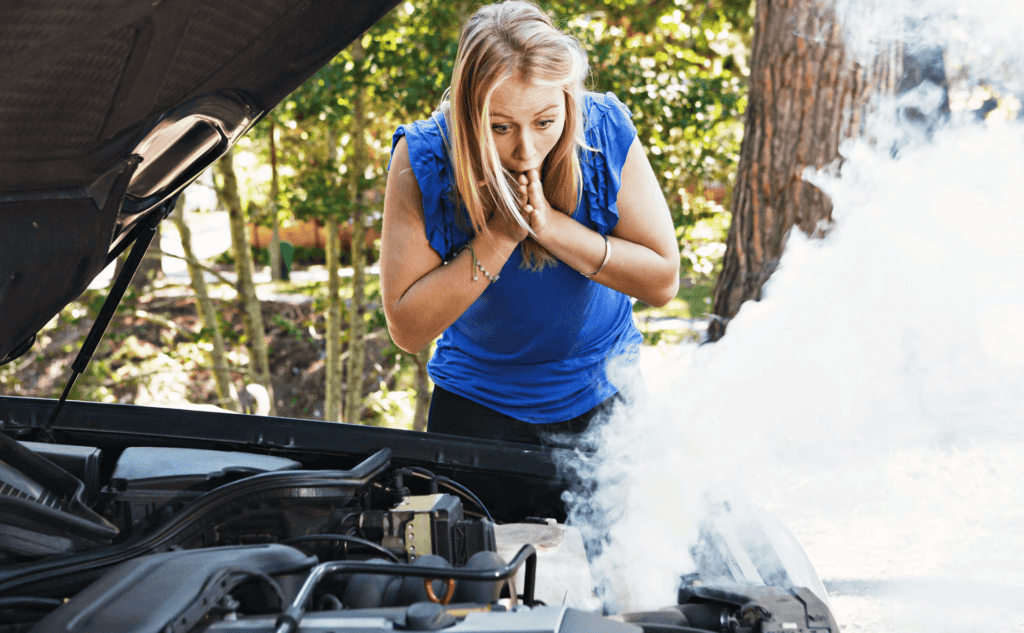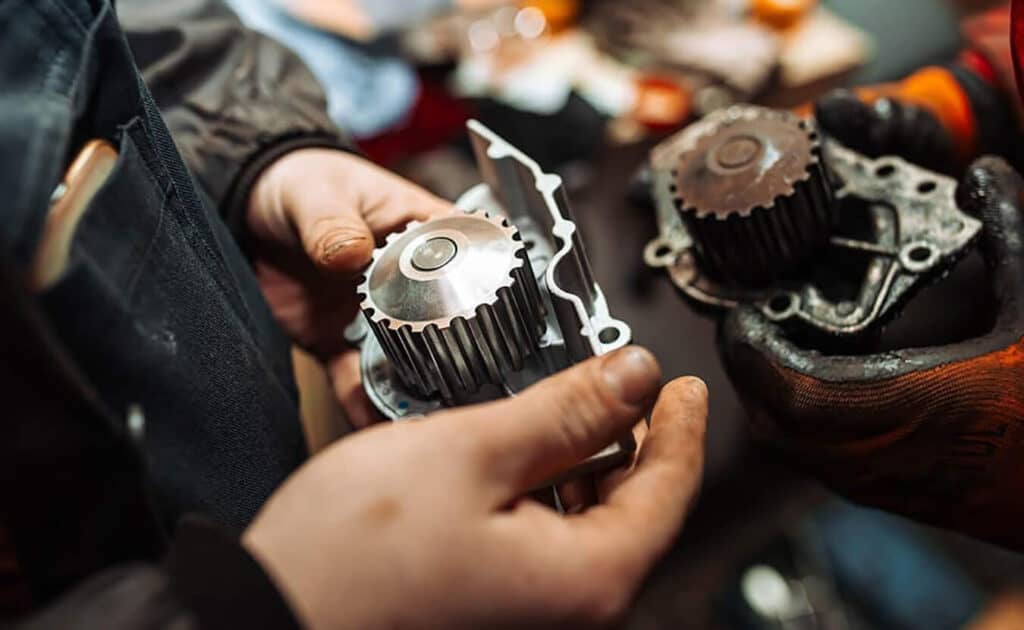The Crucial Role of a Water Pump in Your Vehicle
When you slide behind the wheel of your trusty car, you probably don’t give much thought to the intricate systems that keep it running smoothly. One such unsung hero is the water pump, quietly performing its duty in your car’s engine bay. The water pump plays a critical role in your vehicle’s cooling system, ensuring that the engine operates at the optimal temperature. But what happens when this unassuming component begins to fail? In this article, we’ll explore the significance of the water pump, the signs that it might be in trouble, and the potential risks and consequences of driving with a bad water pump.
Recognizing the Warning Signs: Symptoms of a Failing Water Pump
To safeguard your vehicle from the perils of a failing water pump, it’s imperative to be vigilant and recognize the early warning signs. These symptoms can serve as your car’s distress signals, indicating a potential issue with the water pump:
• Unusual Engine Noises: As you drive, listen for subtle yet distinct whirring or grinding sounds emanating from your car’s engine. These noises, not typical of your vehicle’s usual operation, can be early indicators of water pump trouble.
• Engine Overheating: A malfunctioning water pump can lead to inadequate cooling of the engine. If you notice that your engine temperature gauge is steadily climbing into the red zone or that warning lights on your dashboard are flashing, it’s a clear indication that something is amiss.
• Coolant Leaks: Keep an eye on the ground beneath your vehicle for signs of coolant leaks. Puddles or spots of coolant under your car can be a red flag, suggesting that the water pump may not be effectively circulating coolant.
• Reduction in Coolant Levels: Regularly check your vehicle’s coolant reservoir. If you observe a visible reduction in coolant levels without any apparent leaks, it could signal a problem with the water pump’s ability to maintain the proper coolant circulation.
• Steam from the Engine Bay: In extreme cases, a failing water pump can lead to overheating to the point where steam escapes from the engine bay. If you notice billowing steam or vapor emanating from under the hood, it’s a clear indication of severe cooling system issues.

The Risks of Ignoring Water Pump Issues
So, what if you’re faced with these troubling signs but still contemplate whether it’s safe to continue driving with a bad water pump? Here’s where we need to address a crucial point: ignoring water pump issues can have severe consequences. Continuing to drive with a failing water pump can escalate into a financial and logistical nightmare.
One of the immediate risks is engine damage. A faulty water pump can lead to inadequate cooling, causing the engine to overheat. This, in turn, can result in warped cylinder heads, blown head gaskets, and even engine failure. The repair bills for such engine damage can be exorbitant, far exceeding the cost of addressing the water pump issue promptly.
Beyond engine repairs, driving with a bad water pump can lead to a domino effect of problems. Your vehicle’s overall performance may suffer, leading to reduced fuel efficiency and the potential for costly additional repairs. Moreover, driving with a compromised water pump can result in inconvenient breakdowns, towing fees, and emergency repairs that can strain your budget and disrupt your daily life.
Can You Drive with a Bad Water Pump? Assessing the Risks
• The question often arises: Can you drive with a bad water pump? While it might be tempting to delay repairs in the name of immediate savings, it’s a decision that comes with significant long-term costs and risks. Ignoring water pump issues can have several detrimental consequences:
• Engine Damage: One of the most severe risks of driving with a bad water pump is potential engine damage. The water pump plays a vital role in cooling the engine by circulating coolant throughout the cooling system. A malfunctioning water pump can lead to inadequate cooling, causing the engine to overheat. Over time, this can result in costly engine damage, potentially necessitating a complete engine replacement.
• Reduced Vehicle Performance: A failing water pump can compromise your vehicle’s overall performance. As the engine temperature rises due to inadequate cooling, it may lead to decreased power and efficiency. You might notice sluggish acceleration and decreased fuel economy, which can negatively impact your driving experience.
• Inconvenient Breakdowns: Perhaps the most immediate risk of driving with a bad water pump is the potential for unexpected breakdowns. An overheating engine can leave you stranded on the side of the road, requiring costly towing and emergency repairs. Such breakdowns can also occur at the most inconvenient times, disrupting your daily routine and causing stress.
• Long-Term Costs: While postponing water pump repairs may seem like a way to save money in the short term, it often leads to more substantial expenses down the line. Addressing water pump issues promptly is a proactive measure that can prevent costly engine repairs and ensure your vehicle’s long-term reliability.
In summary, driving with a bad water pump is not advisable due to the significant risks it poses to your vehicle’s engine, performance, and your overall driving experience. Timely repairs or replacement of the water pump are essential to prevent these risks from becoming a reality.
Temporary Measures: Driving Safely with a Compromised Water Pump
If you find yourself in a situation where you must drive with a failing water pump for a short distance, there are some safety measures you can take to minimize damage and stay safe. First and foremost, monitor your engine temperature closely. If it starts to climb into the danger zone, pull over immediately and turn off the engine. Continuing to drive with an overheated engine can lead to severe damage.
Additionally, keep an eye on your coolant levels. Carry extra coolant with you and top off the reservoir if needed. Be prepared for the possibility of coolant leaks, and have the necessary tools on hand to address them temporarily. It’s also advisable to reduce your speed and limit your driving to the bare minimum necessary until you can have the water pump issue resolved.
The Sound of Trouble: Identifying Water Pump Noises
Recognizing the warning signs of a failing water pump is essential for early problem detection. Unusual noises emanating from your car’s engine can serve as a clear indication that something is amiss. When it comes to water pump issues, these noises can manifest as a distinct whining or grinding sound that is out of the ordinary.
If you hear such sounds while driving, especially when accelerating, it’s essential to address the issue promptly. Here’s a breakdown of what these noises might signify:
• Whining Sound: A high-pitched whining sound coming from the engine area can often be associated with a failing water pump. This noise may indicate that the water pump’s bearings are wearing out or that there is increased friction within the pump.
• Grinding Noise: A grinding noise is another concerning sign related to the water pump. It could suggest that the pump’s impeller or other internal components are damaged or deteriorating. This noise typically signifies a more advanced stage of water pump failure.
• Accelerating Noise: Pay close attention to whether these noises become more pronounced when you accelerate. Acceleration can increase the load on the water pump, making any existing issues more noticeable. If the noise intensifies when you step on the gas, it’s a clear signal to have your water pump inspected promptly.
Identifying and addressing these unusual engine noises early can prevent further damage to the water pump and the engine itself. If you suspect water pump problems based on these sounds, it’s advisable to consult a professional mechanic for a thorough inspection and necessary repairs.

Addressing Water Pump Problems: Repair and Replacement Options
When you confront water pump problems, determining the appropriate course of action is essential. The specific approach to address these issues will depend on factors such as the severity of the problem and the extent of the damage. Here are some options to consider:
• Professional Assessment: If you suspect water pump issues or have observed any of the warning signs mentioned earlier, it’s prudent to consult a professional mechanic. They can perform a thorough inspection to diagnose the problem accurately.
• Repair: In some cases, minor water pump issues may be resolved through repair rather than complete replacement. Repair typically involves fixing specific components of the water pump, such as the gasket or pulley, to restore its functionality.
• Replacement: When the water pump damage is extensive or the unit is beyond repair, replacement becomes necessary. This involves removing the old water pump and installing a new one. The cost of replacement can vary depending on factors like your vehicle’s make and model, labor rates, and the choice of parts.
• Cooling System Inspection: Alongside water pump repair or replacement, it’s advisable to inspect and assess the overall health of your vehicle’s cooling system. This ensures that all components, including hoses, thermostat, and radiator, are in optimal condition to prevent future issues.
• Regular Maintenance: To avoid water pump problems altogether, prioritize regular maintenance. Periodically checking your vehicle’s cooling system, monitoring coolant levels, and adhering to recommended service intervals can help prevent water pump issues and ensure a healthy engine.
The Importance of Timely Water Pump Maintenance
In conclusion, the water pump may be a small and often overlooked component of your vehicle, but its role in maintaining engine temperature and overall vehicle health is paramount. Neglecting water pump issues can lead to engine damage, reduced performance, and costly repairs. While it might be tempting to postpone repairs for short-term savings, the long-term costs and risks associated with driving with a bad water pump are substantial.
To avoid these pitfalls, it’s essential to recognize the warning signs of a failing water pump and address them promptly. When you encounter water pump problems, it’s wise to consult a professional mechanic who can assess the issue and recommend the appropriate repair or replacement. By prioritizing timely water pump maintenance, you not only protect your vehicle’s health but also ensure your safety on the road.
If you find yourself in need of water pump inspection or replacement services, consider reaching out to a reliable mobile mechanic service like Uchanics in Canada. Their expertise and convenience can help you maintain your vehicle’s well-being, ensuring a safe and smooth driving experience. Remember, when it comes to your vehicle’s health, timely action is key to avoiding costly consequences.
